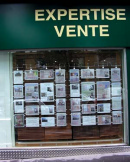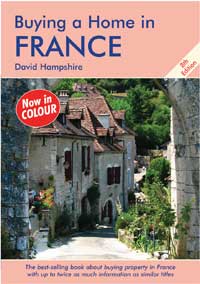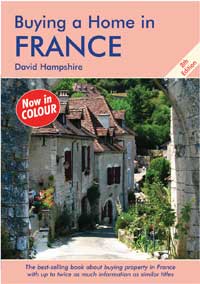A ‘new’ house is generally defined as one built in the last five years, which is also the legal definition. Although new properties may lack the charm and character of older buildings, they offer attractive financial and other advantages. Continue reading “Buying a Home (New) in France”
French estate agents & notaires
 Excerpted from “Buying a Home in France ”
Excerpted from “Buying a Home in France ”
Only some 50 per cent of property sales in France are handled by estate agents (agent immobilier). However, where foreign buyers are concerned, the vast majority of sales are made through agents or handled by notaires ). It’s common for foreigners in many countries, particularly the UK, to use an agent in their own country who works with one or more French agents. A number of French agents also advertise abroad, and many have English-speaking staff (so don’t be discouraged if you don’t speak fluent French). Continue reading “French estate agents & notaires”
Finding a Rental Property in France
Renting in France
Excerpted from “Buying a Home in France 2006”
 Your success or failure in finding a suitable rental property depends on many factors, not least the type of rental you’re seeking (a one-bedroom apartment is easier to find than a four-bedroom detached house), how much you want to pay and the area. France has a strong rental market in most areas, although rural properties are rarely available for long-term rental. Continue reading “Finding a Rental Property in France”
Your success or failure in finding a suitable rental property depends on many factors, not least the type of rental you’re seeking (a one-bedroom apartment is easier to find than a four-bedroom detached house), how much you want to pay and the area. France has a strong rental market in most areas, although rural properties are rarely available for long-term rental. Continue reading “Finding a Rental Property in France”
Buying a Home (Old) in France
 In terms of the fees associated with buying a property, an ‘old’ property is one that’s over five years old that has already had at least one owner. However, the term ‘old home’ usually refers to a building that’s pre-second world war and possibly hundreds of years old and which is either in need of restoration and modernisation or has already been restored.
In terms of the fees associated with buying a property, an ‘old’ property is one that’s over five years old that has already had at least one owner. However, the term ‘old home’ usually refers to a building that’s pre-second world war and possibly hundreds of years old and which is either in need of restoration and modernisation or has already been restored.
If you want a property with abundant charm and character, a building for renovation or conversion, outbuildings, or a large plot, you must usually buy an old property. The advantages and disadvantages of buying a new home ) apply in reverse to an old home. Many old properties purchased by foreigners in France are in need of restoration, renovation or modernisation. Continue reading “Buying a Home (Old) in France”
Buying a Home in France: Prices and Fees
 Apart from obvious points such as size, quality and land area, the most important factor influencing the price of a house is its location. A restored or modernised two-bedroom house might cost €100,000 in a remote or unpopular area but sell for two or three times as much in a popular location. The closer you are to the coast (or Paris), the more expensive a property will be, with properties on the Côte d’Azur the most expensive of all. A Charente farmhouse with a barn and land costs around the same as a tiny studio apartment in Paris or on the Côte d’Azur. Continue reading “Buying a Home in France: Prices and Fees”
Apart from obvious points such as size, quality and land area, the most important factor influencing the price of a house is its location. A restored or modernised two-bedroom house might cost €100,000 in a remote or unpopular area but sell for two or three times as much in a popular location. The closer you are to the coast (or Paris), the more expensive a property will be, with properties on the Côte d’Azur the most expensive of all. A Charente farmhouse with a barn and land costs around the same as a tiny studio apartment in Paris or on the Côte d’Azur. Continue reading “Buying a Home in France: Prices and Fees”
Buying a Home in France: Dealing With Estate Agents
 Only some 50 per cent of property sales in France are handled by estate agents (agent immobilier). However, where foreign buyers are concerned, the vast majority of sales are made through agents or handled by notaires (see below). It’s common for foreigners in many countries, particularly the UK, to use an agent in their own country who works with one or more French agents. A number of French agents also advertise abroad and many have English-speaking staff (so don’t be discouraged if you don’t speak fluent French). Continue reading “Buying a Home in France: Dealing With Estate Agents”
Only some 50 per cent of property sales in France are handled by estate agents (agent immobilier). However, where foreign buyers are concerned, the vast majority of sales are made through agents or handled by notaires (see below). It’s common for foreigners in many countries, particularly the UK, to use an agent in their own country who works with one or more French agents. A number of French agents also advertise abroad and many have English-speaking staff (so don’t be discouraged if you don’t speak fluent French). Continue reading “Buying a Home in France: Dealing With Estate Agents”
House Hunting in France
 There are many ways of finding homes for sale in France; the main methods are listed below:
There are many ways of finding homes for sale in France; the main methods are listed below:
– Newspapers & magazines – including the English-language publications, weekly French property newspapers such as De Particulier à Particulier, Le Journal des Particuliers, La Centrale des Particuliers and La Semaine Immobilière, national newspapers in your home country and France (if you’re looking for an expensive property), local magazines, papers and newssheets (which may have private property advertisements), property magazines published by the French estate agent chains (e.g. ORPI), and general retail publications (e.g. Daltons Weekly and Exchange & Mart in the UK); Continue reading “House Hunting in France”
Buying a Home in France…Rent First!
Once you’ve considered possible locations for your dream home in France, you must decide on the type of property that will best suit your requirements, weigh up the purchase options and assess the fees associated with buying. Continue reading “Buying a Home in France…Rent First!”
Home Exchanges for France
An alternative to renting is to exchange your home abroad with one in France. This way you can experience home living in France for a relatively small cost and may save yourself the expense of a long-term rental. Although there’s an element of risk involved in exchanging your home with another family, most agencies thoroughly vet clients and many have a track record of successful swaps (a recent UK Consumers’ Continue reading “Home Exchanges for France”
Timesharing in France
Excerpted from “Buying a Home in France ”
 Timeshare & Part-ownership Schemes
Timeshare & Part-ownership Schemes
If you’re looking for a holiday home abroad, you may wish to investigate a scheme that provides sole occupancy of a property for a number of weeks each year. Such schemes include part-ownership, leaseback and timeshare (or timesharing). Continue reading “Timesharing in France”
French retirement homes
Excerpted from “Buying a Home in France ”
 Traditionally, the French expect to care for elderly relatives within the family unit (indeed adults are legally obliged to provide for their parents in old age, according to their means), so retirement homes (résidence pour retraités/seniors) are less common than in many other Western countries, although they’re becoming more usual: there are now around 5,000 retirement homes. Continue reading “French retirement homes”
Traditionally, the French expect to care for elderly relatives within the family unit (indeed adults are legally obliged to provide for their parents in old age, according to their means), so retirement homes (résidence pour retraités/seniors) are less common than in many other Western countries, although they’re becoming more usual: there are now around 5,000 retirement homes. Continue reading “French retirement homes”

